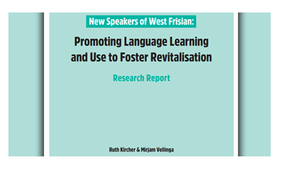Ruth Kircher (Fryske Akademy / Mercator) and Mirjam Vellinga (Afûk) have written the report New Speakers of West Frisian: Promoting Language Learning and Use to Foster Revitalization. The report is about new speakers of West Frisian and promoting language learning and use to foster revitalization. The report is based on the research project on new speakers of Frisian. It first gives an overview of the project design, then discusses the four different components of the project: 1. Motivations to learn Frisian; 2. Attitudes toward Frisian; 3. Evaluations of the standardized variant of Frisian and 4. Use of Frisian. The report presents the main outcomes and results of the project and concludes or with research-based recommendations for language policy and planning measures and future research.
New speakers can play a major role in sustaining a minority language and increasing the number of speakers of that language. They can increase the social networks in which traditional speakers can use their language and ensure that Frisian can be spoken in more places and with more people. This can help raise the status of the language.
Being able to understand
Most new Frisian speakers especially want to be able to understand Frisian. Just over one-third want to be able to actively use it themselves. The biggest motivation to learn Frisian is work-related; another motivation is to belong and want to be part of the local community, such as the village, neighborhood or family. A small group indicates that they wanted to learn the language because of love for languages in general.
It is important in the future to take into account the desire of learners and new speakers to become part of the community on a local level (village, neighborhood, family). Feeling welcome in the local Frisian-speaking environment can be an extra ' boost ' to learning Frisian.
The survey asked about participants' status-related attitudes and solidarity-related attitudes toward Frisian. Participants' status-related attitudes toward Frisian were virtually neutral. Participants did not attribute a high utility value to Frisian. This is probably mainly due to the fact that proficiency in Frisian is not a prerequisite for socioeconomic success. There is a clear positive relationship between participants' language proficiency and status-related attitudes toward Frisian. The better the command of the language, the more positive people are about its usefulness. Participants' solidarity-related attitude toward Frisian was slightly positive. This is probably related to the desire to belong to the local community. Again, there was a clear positive relationship between participants' language skills and their attitudes toward the language. Thereby, participants who lived in rural/village areas had a stronger emotional attachment to the language than those who lived in more urban areas. It would be advisable to promote local social identities that are shared by both traditional and new speakers of Frisian, so that new speakers really feel a sense of belonging to the local community.
Attention to regional variants
The quantitative data revealed that participants rated Afûk Frisian as roughly neutral when it came to anonymity and slightly positive when it came to authenticity. This was a surprising result. Further analysis revealed that in addition to participants rating Afûk-Frisian as Standard Frisian, they also found it authentic because at least some of the teachers also pay attention to regional varieties of Frisian. This was appreciated as positive by the participants. This is consistent with the earlier findings that learners and new speakers like to be part of the local community and speak the Frisian that is spoken there. In addition to learning Standard Frisian, it would be good to also focus on the regional variations of Frisian in the courses. Learning about and from those variations helps new speakers connect with traditional speakers in the local community.
New speakers use Frisian only a little in practice. Participants reported using Frisian 20% of the time in a typical week. Only during classes did some participants use more Frisian than Dutch. Outside the classroom, Frisian is mostly spoken with neighbors, at clubs or within the family, but often not beyond a few standard words or phrases. Participants feel less comfortable speaking Frisian with traditional speakers than in conversation with new speakers.
Participants indicate that they are discouraged from speaking Frisian by the behavior of traditional speakers. These include: refusing to speak Frisian, switching to Dutch in conversation, joking about the new speaker's Frisian, and correcting mistakes. The complex dynamic between traditional and new speakers thus contributes to the language insecurity of the new speakers. This deters them from using Frisian and hinders the success of revitalization efforts.
Traditional speakers can support new speakers
Of the 4 indicated possible positive behaviors that traditional speakers can demonstrate: 1. using words more easily, 2. speaking slowly, 3. frequently asking if someone understands, and 4. explicit encouragement to continue speaking Frisian, the latter was considered the most positive and valuable. The results show that positive responses and encouragement by traditional speakers can contribute greatly to new speakers' use of Frisian. Traditional speakers can thus play a major role in activating new speakers and revitalizing Frisian. In planning measures, it would be good not only to focus on learning the language, but to broaden the focus to the active use of the language among new speakers. Supporting more harmonious relationships between traditional and new speakers and creating common social identities could be important steps in activating new speakers. This study offers much reason and potential for additional research in the areas of language attitudes, motivations to learn the language, thinking about the different language variations, and Standard Frisian and active language use among learners and new speakers.
The full report
New Speakers of West Frisian: Promoting Language Learning and Use to Foster Revitalisation (in English).



